Countertops 101: Everything You Need to Know Before Remodeling Your Kitchen
July 2, 2019 | CR
Countertops 101: Everything You Need to Know Before Remodeling Your Kitchen
Nowadays, interior design has become more complex than before. New styles are being cultivated that are different, unique, and fresh. Kitchen countertops have evolved into more than just a piece of compressed paper to place food and other items atop; it has become a piece of art and a statement to the home. There are many kitchen countertops to choose from: granite, marble, quartz, quartzite, solid surface, ultra-compact, cultured marble, and so on. Deciding upon a countertop for your home may be difficult. What look do you prefer? Do you prioritize style over maintenance? Or would you rather a sturdy stone over one that is softer and more fragile? These are all things to consider, but we know it can be overwhelming. Thus, we have provided you with a countertop 101 that lays out everything you need to know before purchasing the stone that suits you best.Marble
When it comes to marble, style comes easy! It is elegant, shiny, and has a timeless element to it that appears effortlessly beautiful. But be careful – marble is softer and more porous than other stones, making it more susceptible to damages such as chipping, staining and scratching.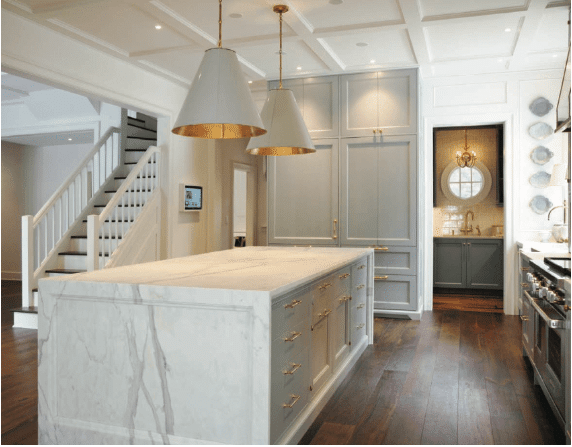 PROS
PROS
- Beauty – classic & timeless
- Availability – because of its high demand, marble can be found at almost any stone fabricator
- Smooth surface
- Prone to scratching/chipping
- Susceptible to stains
- Higher maintenance – in order to prevent damages and stains from occurring, it is important to professionally seal the surface every six months and clean spills/messes immediately
Granite
Granite is one of the most popular stones found in American homes. It is extremely durable and resistant to heat and scratching. However, due to its porous nature, granite has the possibility of obtaining stains from acidic liquids if such products are left on the countertop for too long.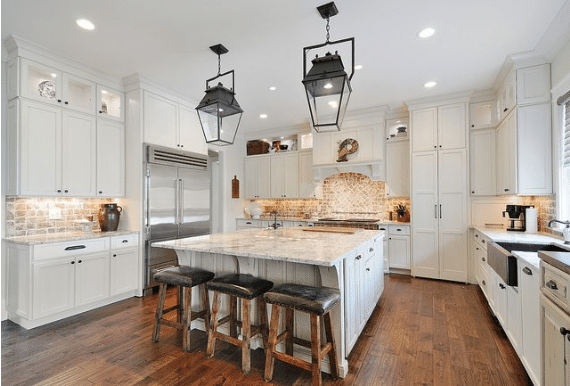 PROS
PROS
- Heat resistant
- Scratch resistant
- Low maintenance
- Resistant to chemicals and stains – this is true when granite is properly sealed by a professional
- Porous material – if not sealed properly, or if sealant wears off, granite can absorb stains that are impossible to remove
- Cost - depending on the rareness or "level" of the design, cost can be high
- Chipping/cracking – this is a rare occurrence, but still possible if a heavy object is dropped on a corner or edge
Quartzite
Quartzite is arguably the strongest natural stone option for your countertop; in fact, it is sturdier than marble and granite. It has the same beautiful essence that marble portrays but can withstand a little more abuse. It is a great solution for an outdoor kitchen because it is resistant to UV rays, but be careful, as quartzite is more prone to scratching.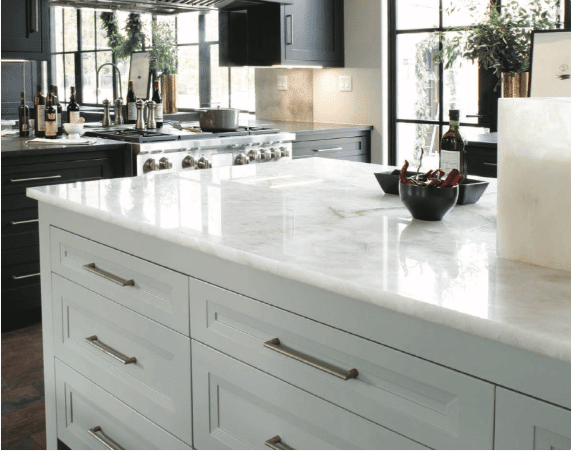 PROS
PROS
- Durable
- Low maintenance
- UV resistant – no need to worry about fading if placed outdoors
- Scratching – we recommend using a cutting board
- Damage from heat – use trivets for hot pots and pans
- Sealing – make sure it is installed and sealed professionally on a regular basis to prevent future damages
- Limited color options – due to its naturality, quartzite contains more neutral colors and less variety of color
Quartz
Different from quartzite, quartz is a non-porous stone that is durable, resistant to many damages, and is very easy to maintain. Because it is a manufactured product, quartz offers a wide range of hues, seeveral finish options, and its final appearance is rich and luxurious.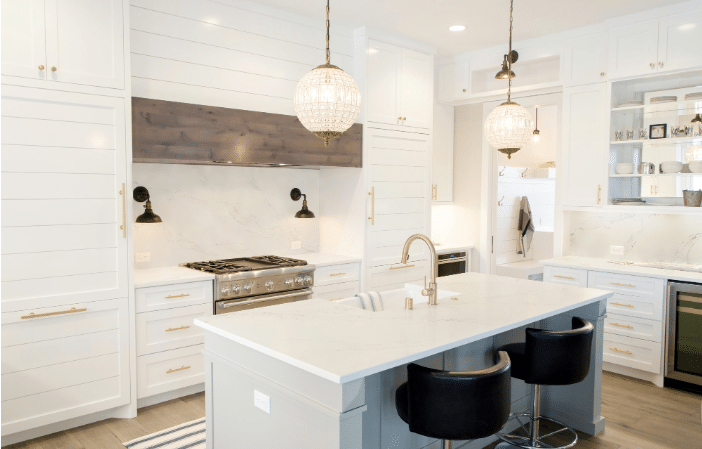 PROS
PROS
- Very durable
- Non-porous – there is no need for a sealant
- Wide range of designs and colors
- Scratch, chip & crack resistant
- Stain resistant
- Does not harbor bacteria
- Price
- Receptive to heat
- Should not be used outside
Solid Surface
Solid surface countertops are a man-made material composed of polyester resins, pigments or other elements that do not require seam installations. It is a highly flexible material, comes in a variety of color options, and integrates smoothly with sinks and backsplash.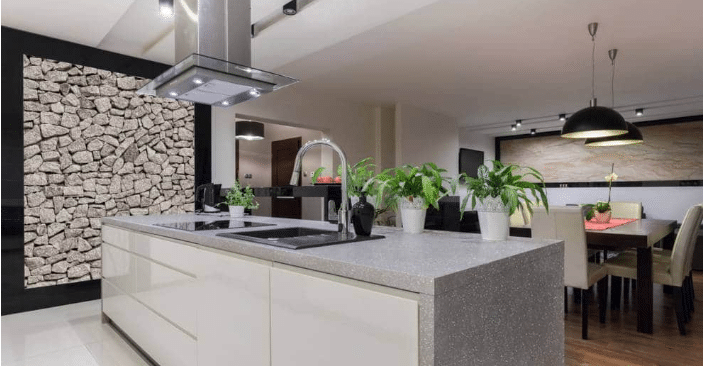 PROS
PROS
- Durable
- Smooth surface
- Seamless
- Ability to sand away stains or scratches
- Wide range of colors & patterns
- Receptive to heat
- Can scratch and dent
- Possibility of stains
Ultra Compact
Ultra compact surfaces are made from raw materials found in glass, porcelain, and quartz, which are then put under extreme heat and pressure to create an almost indestructible material. These countertops are one of the most durable options on the market today!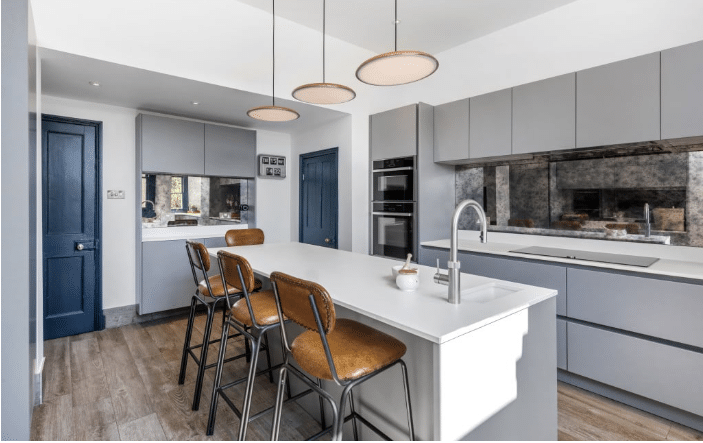 PROS
PROS
- Durable
- Heat resistant
- Scratch, chip, and crack resistant
- UV resistant - perfect for outdoor use
- Limited fabricators and installers - because proper install requires certification, it may be more difficult to find a reliable pro who can do a beautiful job
Cultured Marble
Cultured marble is a fun twist to the regular, natural marble. It is made up of a blend of marble dust and polyester resin to produce a wide range of color and natural looking patterns. Because it is a man-made product, cultured marble is non-porous and thus does not require sealant. The molds are lined with a special, clear gel that creates a transparent finished surface.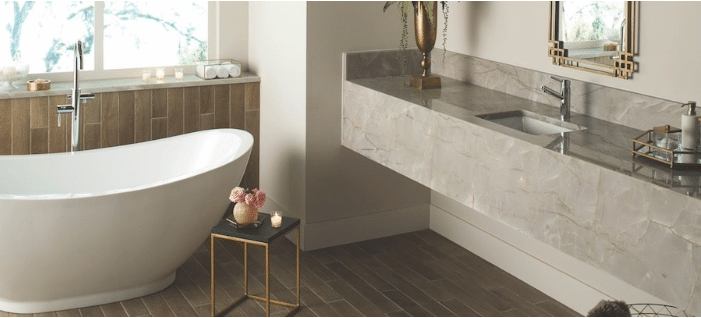 PROS
PROS
- Low maintenance
- Durable
- Customizable
- Affordable
- Difficult to remove scratches
- Prone to stains


